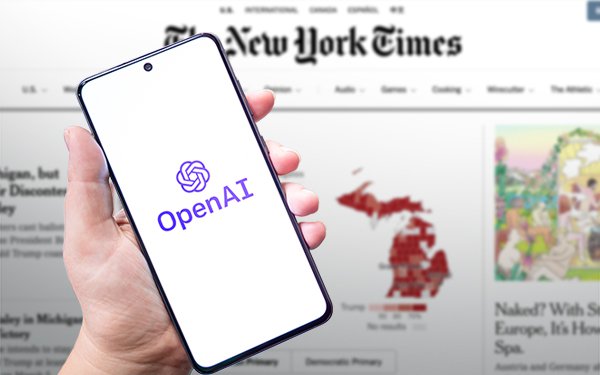
Striking back at The New York Times,
artificial intelligence company OpenAI says key allegations in the newspaper's highly publicized copyright infringement complaint “do not meet its famously rigorous journalistic
standards.”
“The truth, which will come out in the course of this case, is that the Times paid someone to hack OpenAI's products,” the company writes in papers filed
Monday with U.S. District Court Judge Sidney Stein in the Southern District of New York.
The artificial intelligence business adds that it took “tens of thousands of attempts” to
produce the “highly anomalous” results that the Times cited as examples of OpenAI displaying large portions of articles in response to prompts by users.
The filing comes in
response to the Times' lawsuit alleging that OpenAI infringed copyright in several ways -- including by using
newspaper articles to train chatbots, and by reciting large portions of articles verbatim in responses to queries.
advertisement
advertisement
Times' counsel Ian Crosby, a partner in Susman Godfrey, disputed OpenAI's use
of the term "hacking."
“What OpenAI bizarrely mischaracterizes as ‘hacking’ is simply using OpenAI’s products to look for evidence that they stole and
reproduced The Times’s copyrighted works,” Crosby stated through a spokesperson.
“In this filing, OpenAI doesn't dispute -- nor can they -- that they copied millions of The
Times's works to build and power its commercial products without our permission,” Crosby added.
Among other allegations in the complaint, the newspaper said OpenAI's display
of significant portions of articles could divert paying subscribers from the newspaper, leading to a drop in revenue.
“If The Times and other news organizations cannot produce and
protect their independent journalism, there will be a vacuum that no computer or artificial intelligence can fill,” the company wrote in its complaint.
OpenAI counters in its new filing
that a hacker hired by the newspaper exploited a bug “by using deceptive prompts that blatantly violate OpenAI’s terms of use.”
“Normal people do not use OpenAI’s
products in this way,” the company writes. “The Times’s suggestion that the contrived attacks of its hired gun show that the Fourth Estate is somehow imperiled by this technology is
pure fiction. So too is its implication that the public en masse might mimic its agent’s aberrant activity.”
In addition to broadly criticizing the Times' complaint, the artificial
intelligence company argued to Stein that the lawsuit should be narrowed.
For instance, OpenAI urged Stein to dismiss claims relating to activity that allegedly occurred more than three years
ago, citing the copyright law's statute of limitations.
Crosby responded that OpenAI "has been secretive and has deliberately concealed how its products operate," adding that the newspaper
disagrees that some of its claims are untimely.
OpenAI also indicated it plans to argue that using newspaper articles to train chatbots is a fair use, and therefore doesn't infringe
copyright.
“There is a long history of precedent holding that it is perfectly lawful to use copyrighted content as part of a technological process that (as here) results in the creation
of new, different, and innovative products,” the company argues, referencing a federal ruling that cleared Google of infringing copyright by digitizing books and displaying excerpts
of them in its search engine.
“Established copyright doctrine will dictate that the Times cannot prevent AI models from acquiring knowledge about facts, any more than another news
organization can prevent the Times itself from re-reporting stories it had no role in investigating,” OpenAI adds.